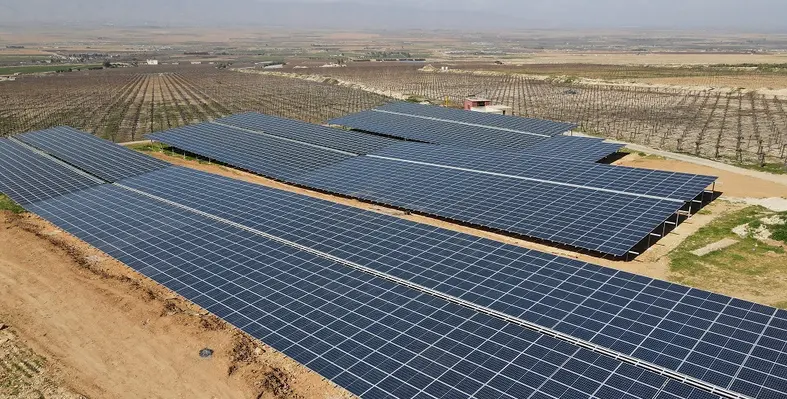Apex Energy have conduct a study and provided a solar powered solution to power irrigation wells in Al Qaa, Lebanon cutting costs for farmers
A 135km drive from Beirut, going through Zahle and then Baalbeck, will lead you to Al Qaa. With a close proximity to the northern Lebanese - Syrian border and inhabited by some 12,000 people, Al Qaa has witnessed an agricultural boom in the last 30 years.
Before the 1950s, Al Qaa was a small village with only a few houses. Soon after, it started expanding, benefiting from the water flowing from Al Labweh springs to irrigate the agricultural fields.
Since the civil war, water flowing from the Labweh springs has dramatically diminished, and the agricultural land had to survive on deep well water.
Five minutes by car from the town centre, on the hillside called ?Masharih Al Qaa?, where the ?Green Hill? farm is situated, and where grapes grow side by side with peaches and nectarines on a total area of 2.5mn sq m. Irrigation needs are covered by 15 deep wells powered by diesel generators as the national electricity grid does not extend to this part of Lebanon.
Diesel cost accounts for around 35% of the total cost of crop production and this formed a heavy burden on the shoulders of the farm owners who were originally suffering from the consequences of the lost markets in Syria and Iraq following the Syrian civil war.
In addition, fuel shortages in Lebanon in the past 2 years caused the owners to look for a sustainable alternative solution to cover their power and water needs.
Pumping water using solar energy was the only logical answer to all these issues. Apex Energy, owned by engineer Said Riachi, was selected to conduct a study and provide a solution.
The company conducted a thorough study on the wells from the perspective of water availability and need throughout the year, and decided to build a solar-powered system to fulfill the need during the day.
The selection of material is a critical factor in every engineering project's success or failure. For this project, top quality components were selected such as Jinko Solar's photovoltaic (PV) panels and electrical components from Eaton.
Jinko Solar is at the top of the list when it comes to the reputation, quality and reliability of PV panels worldwide.
Eaton is one of the largest suppliers of electrical components globally. Solar VFDs (variable-frequency drive), industrial controllers, switching and protection equipment were all sourced from Eaton for the project.
A total of around 20,000 sq m of solar panels were installed to generate a 3.7MW of electrical energy at peak hours, operating 10 deep well submersible pumps for a duration of 9 hours per day at full capacity during hot summer days. Outside sun hours, the system can operate in diesel only or hybrid mode - using whatever energy the sun can provide and supplement it with diesel energy. An industrial controller was utilised to automatically govern all modes of operation and all scenarios.
To make it easier for users to operate the system, the user interface was designed so that the operator has to flip a switch to on to start the system and begin pumping and flip back the same switch to off to cease. Everything in between on and off is managed automatically by the system itself.
Losing the electricity source in an agricultural farm means interrupted water supply, which carries the risk of losing a few years of work efforts in just days. So, in the case of Green Hill, in a way, it was a matter of life or death and not just a matter of savings.
Another pleasant effect to implementing solar solutions is the pollution reduction effect: noise coming from the generators and fumes coming out of the exhausts were reduced to a minimum making a walk among the trees at Green Hill during a spring day a wonderful experience.







